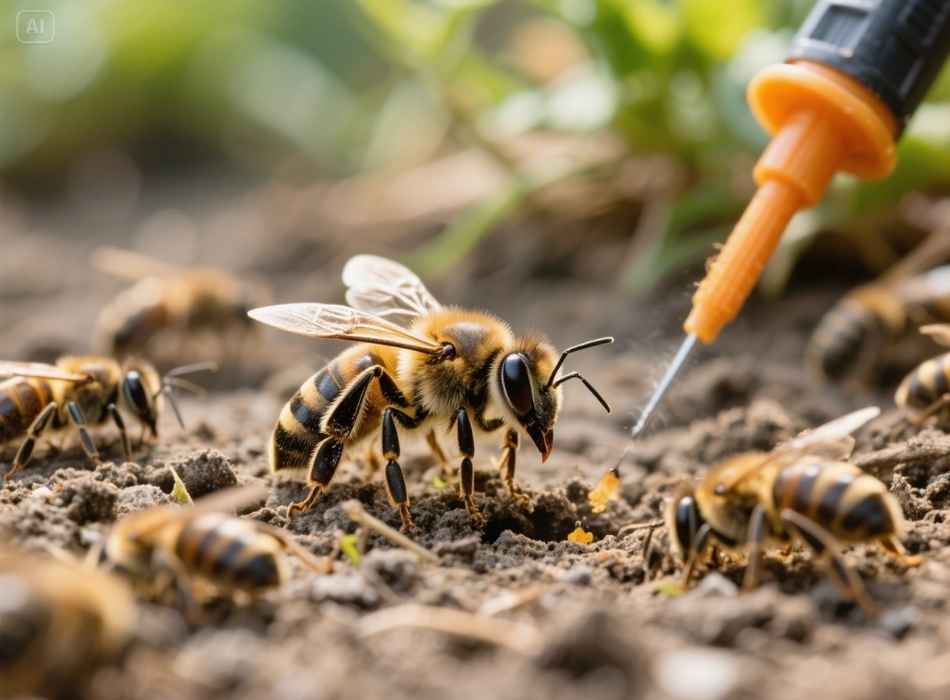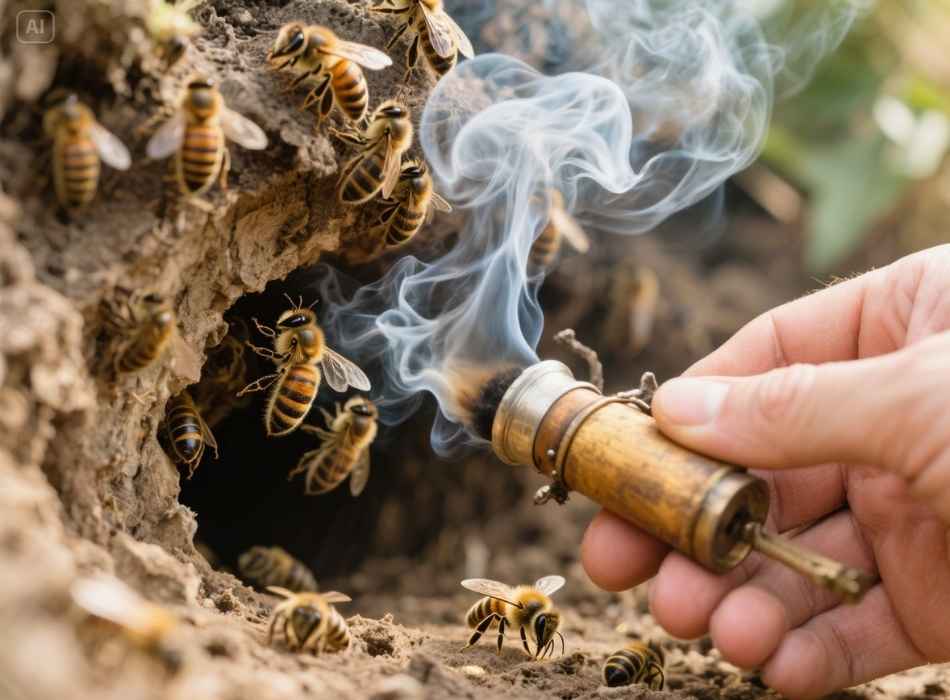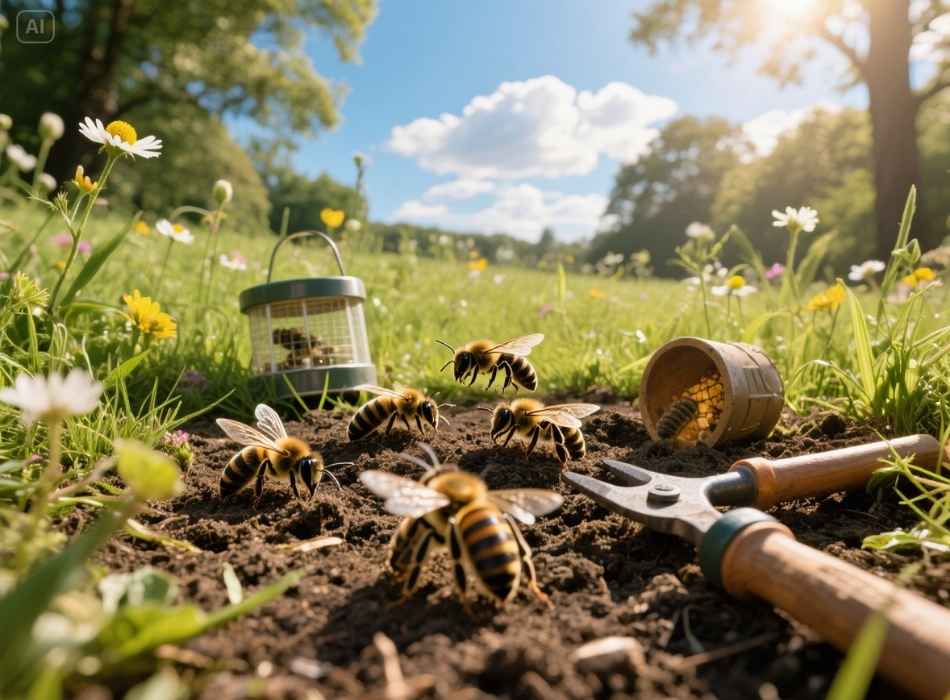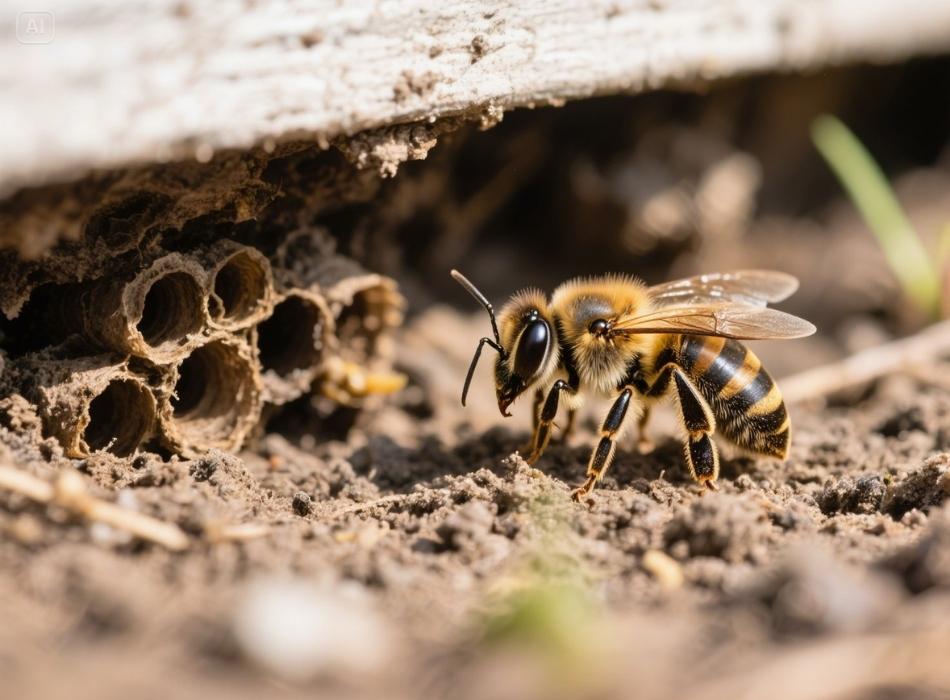Ground bees, also known as mining bees, play an essential role in pollination and maintaining healthy ecosystems. However, if their nests are built too close to your home or in high-traffic areas, they can become a nuisance or even a potential hazard for families. Suppose you’re dealing with these insects and need to act quickly. In that case, this blog will provide helpful context on ground bees, outline methods to address them and present safer alternatives for humans and the environment.
Understanding Ground Bees

Before jumping into solutions, it’s essential to understand the type of bees you might be dealing with.
What Are Ground Bees?
Ground bees are a group of solitary bees that nest and burrow in soil. Unlike honeybees or wasps, they live alone, although you may find many nests close to one another. Typically active in spring, these pollinators are non-aggressive, with female bees focused on collecting nectar and pollen to provide for their larvae.
Are Ground Bees Dangerous?
Groundbees are generally harmless. They are not known for aggressive stinging behaviour and will only sting if provoked. Their presence provides significant environmental benefits, as they assist in pollinating plants. When possible, it’s best to avoid killing these beneficial insects unless their nests create a direct safety hazard.
What Can Kill Ground Bees Instantly?

If removing or neutralizing ground bees becomes necessary, some methods will kill them instantly. It’s crucial to approach this responsibly and consider the consequences for your local ecosystem.
1. Use Boiling Water
One of the most straightforward and accessible methods to kill ground bees is pouring boiling water into the entrance of their nests. This approach is chemical-free and can be highly effective. However, boiling water can also harm surrounding vegetation, so use caution if deploying this method in gardens or landscaped areas.
Steps to Use Boiling Water Effectively:
- Locate the ground bee holes during the cool evening when bees are less active.
- Heat a large pot of water to a boil.
- Carefully pour the water into the burrow entrance to kill the bees instantly.
Note: Always wear protective clothing to minimize the risk of being stung during the process.
2. Apply Vinegar Solutions
Vinegar is a natural product that acts as an effective pesticide. Due to its acidic nature, it can kill ground bees upon contact.
How to Create and Use a Vinegar Solution:
- Mix equal parts white vinegar and water in a spray bottle.
- Locate the bee nest entrance and spray the solution liberally into the hole.
- For large infestations, pour the solution directly into the nest.
This method is fast, non-toxic to pets and humans, and readily available in most households. However, remember that vinegar can affect nearby plants if applied carelessly.
3. Chemical Sprays
There are bee- or wasp-specific pesticides available that can kill ground bees instantly. While highly effective, these solutions should be used sparingly. When overused, pesticides contain strong chemicals that can harm other beneficial insects, animals, and the surrounding environment.
Steps for Safe Chemical Use:
- Always read the product label and follow instructions closely.
- Apply sprays early in the morning or late at night when bees are inactive.
- Wear protective equipment to avoid inhaling fumes or getting the pesticide on your skin.
- Consider environmentally safe insecticide products when choosing a spray.

4. Smoke
Smoke is another natural way to kill or deter bees from their nests. Bees have a natural aversion to smoke, which disrupts their behaviour and drives them out of their burrow. Prolonged exposure to dense smoke can kill them if necessary.
How to Use Smoke Against Ground Bees:
- Light a pile of paper or dry wood near the nest’s entrance.
- Allow the smoke to drift into the holes and disrupt the bees.
- Keep the fire under supervision and ensure the area is safe from hazards.
This method can drive bees away rather than kill them outright, making it a valuable option for relocation purposes.
Considerations Before Killing Ground Bees
While the above methods can eliminate ground bees, weighing your options and considering their environmental impact is wise. Bees, including ground bees, are valuable for ecosystems and play a vital role in food production. Non-lethal measures should be prioritized.
Safe Alternatives to Killing Ground Bees

If you want to handle ground bees responsibly, here are a few alternative approaches.
1. Relocate Them
Contact a local beekeeper or pest control expert specializing in live bee removal. Many professionals can safely relocate ground bees without harming or disrupting your property.
2. Deter Them Naturally
Make your garden less appealing to ground bees by taking the following steps:
- Cover bare soil with grass, mulch, or dense plants to reduce nesting opportunities.
- Spray the nests with water frequently to make them less viable homes.
- Sprinkle cinnamon near the burrow entrance as a natural deterrent (bees dislike strong, spicy smells).
3. Wait for Them to Depart
Ground bees often have short lifespans and stay active only for a few weeks during the spring. They will leave naturally without intervention if you can avoid their nests during this period.
Call in a Professional
If a large infestation threatens safety, you may need to contact a licensed pest control service. Reputable pest control companies can handle the removal process ethically and professionally, tailoring their solutions to minimize environmental damage.
Protecting Bees While Addressing Concerns
Bees are indispensable to our ecosystem; killing them should always be a last resort. Ground bees are relatively harmless, and their presence can usually be mitigated through non-lethal measures.
If eliminating ground bees becomes unavoidable, consider using natural methods like boiling water or vinegar solutions, which are less disruptive than traditional pesticides. Opt for relocation or deterrent methods to protect these essential pollinators whenever possible.
By making informed decisions and considering long-term environmental impacts, you can address ground bee concerns safely and responsibly.











